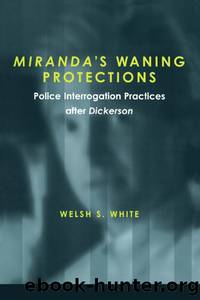Miranda's Waning Protections by White Welsh S.;

Author:White, Welsh S.;
Language: eng
Format: epub
Publisher: University of Michigan Press
CHAPTER 9
Mirandaâs Limitations
One of the most interesting aspects of the Dickerson decision was the Court's response to the request that Miranda v. Arizona1 be overruled. In a revealing portion of the majority opinion, Justice Rehnquist seemed to indicate that the Court would not âagree with Mirandaâs reasoning and resulting ruleâ if it âwereâ¦addressing the issue in the first instance.â2 In rejecting the constitutional attack on Miranda, however, he stated that âprinciples of stare decisis weigh heavily against overruling it now.â3
But if a majority of the Court disagreed with Mirandaâs constitutional holding, why should it reject an opportunity to overrule or at least modify the Warren Court's landmark decision? As the majority itself acknowledged,4 stare decisis has not been an impediment to overruling other constitutional decisions. Did Dickerson refuse to consider overruling Mirandaâs constitutional holding simply because, as Justice Rehnquist put it, the Miranda âwarnings have become a part of our national cultureâ?5 Or, as another commentator has asserted, should Mirandaâs survival more appropriately be attributed to the fact that the Court considered the constitutionality of the statute overruling Miranda âat the very moment when the Court's interest in protecting its constitutional turf against Congressional incursions was at a peak unmatched in recent yearsâ?6
Identifying the precise reasons for Dickersonâs rejection of the constitutional assault on Miranda is, of course, impossible. In my judgment, however, a major reason for the Court's disinclination to overrule Miranda relates to Mirandaâs limitations. By the time the Court confronted the issue in Dickerson, it had become obvious that, regardless of what the Warren Court may have intended, Mirandaâs safeguards today provide very limited restraints on police interrogators.
To some extent, of course, Mirandaâs limitations may be attributed to post-Miranda decisions. As I explained in chapter 6, decisions by the Burger and Rehnquist Courts substantially weakened Mirandaâs protections.7 Indeed, as interpreted by the present Court, Miranda essentially provides suspects with two safeguards: first, the suspect will be informed of his four Miranda rights prior to police questioning; and, second, through invoking either his right to remain silent or his right to have an attorney present at questioning, the suspect has at least a theoretical opportunity to either forestall police questioning entirely or to bring it to a halt at any point after it commences.
These safeguards are not insignificant. As I indicated in chapter 7, there is probably a small group of suspects who choose to remain silent as a result of hearing the Miranda warnings. In addition, the warnings may lead some suspects to invoke their rights at some point during the interrogation, thereby reducing the extent of their incriminating statements to the police. In the great majority of cases, however, the Miranda safeguards do not provide significant restraints on police interrogating suspects.
For constitutional purposes, of course, the question is whether Mirandaâs safeguards combined with the Court's other constitutional restrictions on interrogation practices provide a constitutionally appropriate accommodation between promoting law enforcement's interest in obtaining reliable incriminating statements and protecting suspects from pernicious interrogation practices. In addressing this
Download
This site does not store any files on its server. We only index and link to content provided by other sites. Please contact the content providers to delete copyright contents if any and email us, we'll remove relevant links or contents immediately.
Spell It Out by David Crystal(36108)
Life for Me Ain't Been No Crystal Stair by Susan Sheehan(35794)
Cecilia; Or, Memoirs of an Heiress — Volume 1 by Fanny Burney(32536)
Cecilia; Or, Memoirs of an Heiress — Volume 2 by Fanny Burney(31934)
Cecilia; Or, Memoirs of an Heiress — Volume 3 by Fanny Burney(31925)
The Great Music City by Andrea Baker(31911)
Professional Troublemaker by Luvvie Ajayi Jones(29644)
We're Going to Need More Wine by Gabrielle Union(19030)
The Secret History by Donna Tartt(19023)
Twilight of the Idols With the Antichrist and Ecce Homo by Friedrich Nietzsche(18617)
All the Missing Girls by Megan Miranda(15921)
Cat's cradle by Kurt Vonnegut(15324)
Pimp by Iceberg Slim(14476)
Bombshells: Glamour Girls of a Lifetime by Sullivan Steve(14046)
For the Love of Europe by Rick Steves(13853)
Talking to Strangers by Malcolm Gladwell(13339)
Norse Mythology by Gaiman Neil(13331)
Fifty Shades Freed by E L James(13227)
The Social Justice Warrior Handbook by Lisa De Pasquale(12182)
